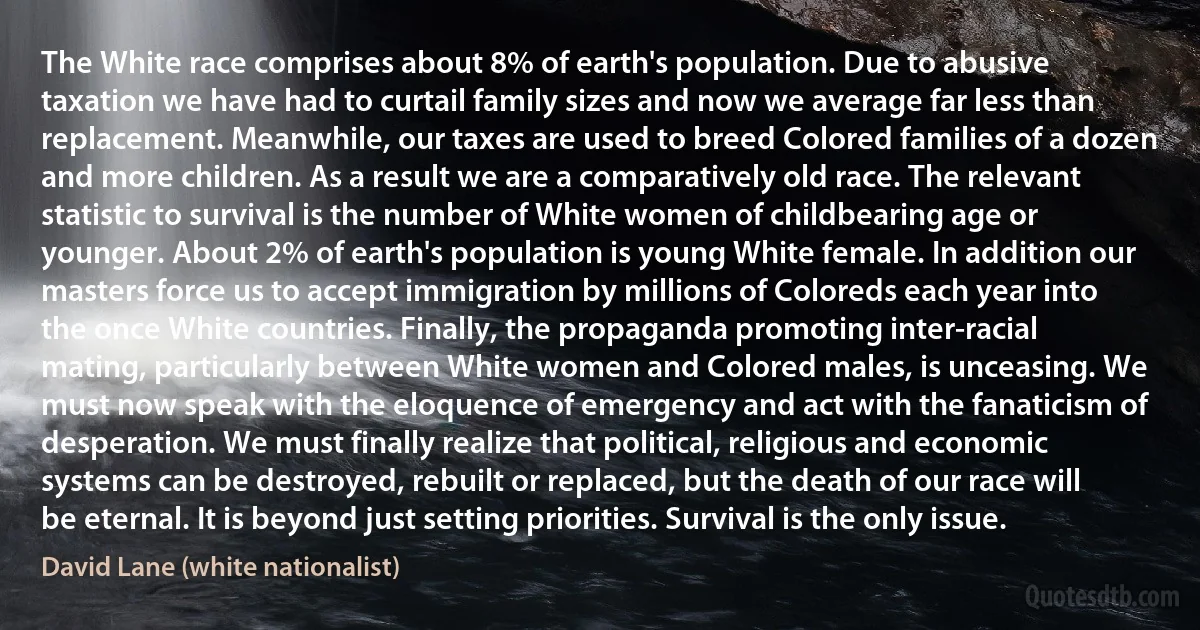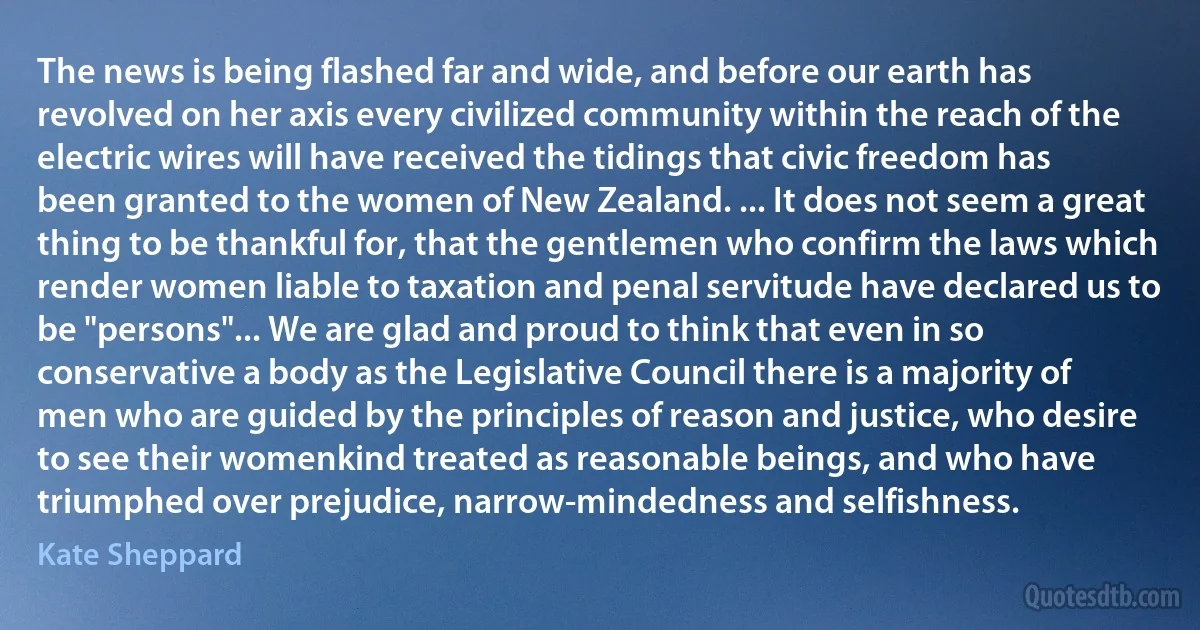Taxation Quotes - page 8
Too much of Finnish reality depends on uniquely Finnish circumstances. Finland is as big as two Missouris, but with just 5.2 million residents, it's ethnically and religiously homogeneous. A strong Lutheran work ethic, combined with a powerful sense of probity, dominates the society. Homogeneity has led to consensus: Every significant Finnish political party supports the welfare state and, broadly speaking, the high taxation that makes it possible. And Finns have extraordinary confidence in their political class and public officials. Corruption is extremely rare.

Robert G. Kaiser
This is not the time for political fun and games. This is the time for a new beginning. I ask you now to put aside any feelings of frustration or helplessness about our political institutions and join me in this dramatic but responsible plan to reduce the enormous burden of Federal taxation on you and your family.

Ronald Reagan
While releasing the tax data, Prime Minister Narendra Modi said that it should lead to enhanced insights for policymaking on taxation. What he did not say was that it was a scathing commentary on the nation. Unless the cultural idea of the nation as comradeship and fraternity is complemented by material and economic arrangements that realise this, the nation will remain only in name.

Narendra Modi
So far as I have listened, before a revolution can take place, the population must lose faith in both the police and the courts.”
"Elementary. Go on.”
"Well...high taxation is important and so is inflation of the currency and the ratio of the productive to those on the public payroll. But that's old hat; everybody knows that a country is on the skids when its income and outgo get out of balance and stay that way-even though there are always endless attempts to wish it away by legislation.

Robert A. Heinlein
The political horizon would be greatly clarified if the voters were offered the choice of three parties representing three strategies: A conservative party committed to the preservation of individualism, perhaps in a highly modified form; a communist party bent upon revolutionary changes through violent seizure of power, confiscation, and a proletarian dictatorship; and a radical party seeking to socialize the basic industries and to move toward an equalization of economic privilege through purchase, taxation, and drastic regulation, without resorting to confiscation or armed seizure of power.

Kirby Page
If the middle class prefer an alliance with the aristocratic or ruling party, to the cordial co-operation and help of the great nation now excluded from the franchise and from all political power, they must be content with a profligate government expenditure, and a taxation burdensome from its amount, and insulting from its inequality and injustice.

John Bright
My belief is, that a wiser decision than that to which you came-to subject property to direct taxation within certain limits-to remove the prohibition upon foreign cattle-to permit swine and sheep to be imported-to reduce the duty on corn, on sugar, on lard, on butter, and on cheese-you never made. My belief is that you have been amply repaid for any loss you may have sustained by that reduction; that you have gained the confidence and goodwill of the labouring classes in this country, by parting with that which was thought to be directly for the benefit of the landed interest. It was that confidence in the generosity and justice of Parliament which in no small degree enabled you to pass triumphantly through that storm which convulsed other nations during the year 1848.

Robert Peel
For the last fourteen years, I have advocated the elimination of all payroll taxes - including those for social security and unemployment compensation - and the replacement of that revenue in the form of pollution taxes - principally on CO2. The overall level of taxation would remain exactly the same. It would be, in other words, a revenue neutral tax swap. But, instead of discouraging businesses from hiring more employees, it would discourage business from producing more pollution.
Global warming pollution, indeed all pollution, is now described by economists as an "externality." This absurd label means, in essence: we don't need to keep track of this stuff so let's pretend it doesn't exist.
And sure enough, when it's not recognized in the marketplace, it does make it much easier for government, business, and all the rest of us to pretend that it doesn't exist. But what we're pretending doesn't exist is the stuff that is destroying the habitability of the planet.

Al Gore
The next objection to the Chinese is that he cannot be induced to swear by the Bible. This is to me one of his best recommendations. The American people will swear by any thing in the heaven above or the earth beneath. We are a nation of swearers. We swear by a book whose most authoritative command is to swear not at all. It is not of so much importance what a man swears by, as what he swears to, and if the Chinaman is so true to his convictions that he cannot be tempted or even coerced into so popular a custom as swearing by the Bible, he gives good evidence of his integrity and of his veracity. Let the Chinaman come; he will help to augment the national wealth; he will help to develop our boundless resources; he will help to pay off our national debt; he will help to lighten the burden of our national taxation; he will give us the benefit of his skill as manufacturer and as a tiller of the soil, in which he is unsurpassed.

Frederick Douglass
The government is an agency of legalized force. It has exhibited skill and efficiency in only one area-that of collecting whatever it wants from the populace. There are three things government traditionally takes away from the people over whom it exercises coercion. It takes their money and we call it ‘taxation.' It takes their property and we call it ‘eminent domain.' Or, it takes them as people. We call this a ‘draft.'

Robert LeFevre
We have been building up, not dissipating, overseas assets. The question is whether, while so doing, we have been neglecting our investment at home and particularly that in the public services. There is no doubt, in my mind at any rate, about the ability of a low taxation market-oriented economy to produce consumer goods, even if an awful lot of them are imported, far better than any planned economy that ever was or probably ever can be invented. However, I am not convinced that such a society and economy, particularly if it is not infused with the civic optimism which was in many ways the true epitome of Victorian values, is equally good at protecting the environment or safeguarding health, schools, universities or Britain's scientific future. And if we are asked which is under greater threat in Britain today-the supply of consumer goods or the nexus of civilised public services-it would be difficult not to answer that it was the latter.

Roy Jenkins
Callaghan resigned as Chancellor after devaluation. His place was taken by Roy Jenkins who was, in my judgment, the ablest of the four Chancellors I served. He listened to advice, but made up his own mind, explaining to his advisers the grounds for his decision. He was at times able to foresee contingencies of which his staff had not warned him, such as the possible devaluation of the French franc, and was judicious in assessing such contingencies and deciding what measures were appropriate to the circumstances. He was not afraid to take extreme measures to overcome major dangers, adding more to taxation and cutting more from public expenditure than his advisers suggested and showing a sound judgment of what was at stake. This resoluteness in the circumstances in which he took office enabled him to carry the Cabinet with him after three years in which they had shrunk from much milder action.

Roy Jenkins
The Government know perfectly well that, in order to cope with the rising inflation and disastrous trade balance, it is indispensable to budget for a severe increase in taxation and a further reduction in the rate of growth of public expenditure. They have the majority and the authority to do this now. They do not need an election in order to act in the national interest. Nor do they need an election to get the country back to full-time work. Neither the miners nor the other trade unions have broken the law or threatened to break it. There is nothing sacrosanct about stage 3 or the Government's interpretations of it. A settlement will have to be found in the mining industry – and in every other industry – which will get the necessary labour into the necessary jobs.

Enoch Powell
The recent local elections revealed concern about the quality of some public services which the Government will need to weigh carefully in the coming consideration of our national spending priorities. As people become personally better off their expectations of services naturally rise too and we need to take this into account. ... We should continue to aim at a further reduction in the level of taxation. But many of our supporters will be looking for us to strike a balance in terms of the realities of 1986.

Douglas Hurd
As my former colleague Milton Friedman often said, ‘Government spending is taxation.' Beyond the essential services government provides - such as roads, courts, schools, police and fire services, and the military - government spending doesn't actually create resources. It just redistributes resources. For every beneficiary of government largesse, there's someone who pays for that largesse.

Arthur Laffer
So impressive was Ashoka's example that many other Asian monarchs adopted it. Japan's Prince Shotuku, for example, used it to unify the Japanese nation and improve international relations. For this policy, the renowned historians Arnold Toynbee and H.G. Wells have called Ashoka the greatest monarch who ever lived. Furthermore, when India commanded superiority in the eyes of the nations that wanted to receive its Buddhist civilization (such as China, Mongolia, Cambodia, Indonesia and Thailand), there was never any attempt to impose rulers or governance on others, or ask for taxation or tribute to any Indian nexus, or subvert the native cultures, languages and histories of those nations. The contrast between this and the manner in which Western civilization has spread is stark and warrants greater attention.

Rajiv Malhotra
The Joint Legislative Committee, established by the Revenue Act of 1926, has been particularly helpful to the Treasury Department. The members of that Committee have generously consulted with administrative officials, not only on broad questions of policy but on important and difficult tax cases. On the basis of these studies and of other studies conducted by officials of the Treasury, I am able to make a number of suggestions of important changes in our policy of taxation. These are based on the broad principle that if a government is to be prudent its taxes must produce ample revenues without discouraging enterprise; and if it is to be just it must distribute the burden of taxes equitably. I do not believe that our present system of taxation completely meets this test. Our revenue laws have operated in many ways to the unfair advantage of the few, and they have done little to prevent an unjust concentration of wealth and economic power.

Franklin D. Roosevelt
In many ways, the US led the world toward the development of progressive taxation and the reduction of inequality at the global level during the first half of the 20th century... Unfortunately, one century later, in 2019, the rise of inequality creates new threats to liberal democracies. It is time to take a new step and to develop new policy instruments, in line with the challenges raised by global wealth trends.

Thomas Piketty



